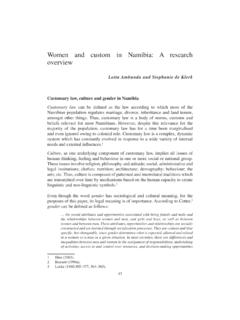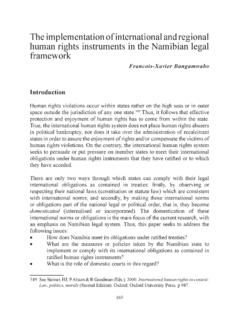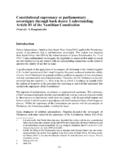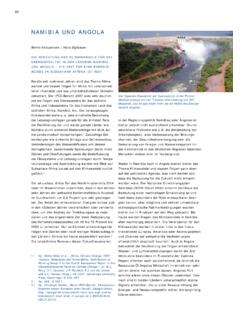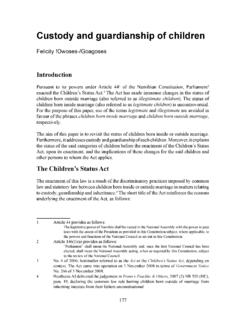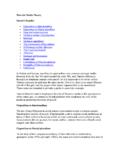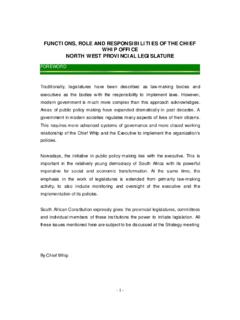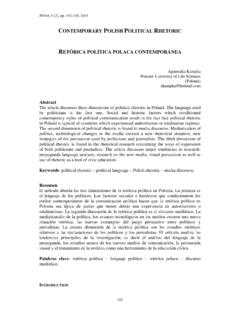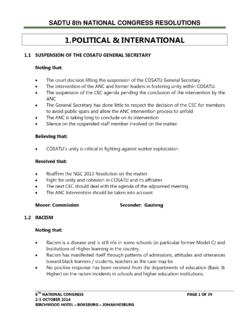Transcription of 8 Zambia - Konrad-Adenauer-Stiftung
1 1 INTRODUCTION1 The Republic of Zambia has a population of just less than 13 million. The officiallanguage is English and there are over 70 local languages and dialects. Literacy ratesare approximately 61% for women and 82% for men. Zambia is a former Britishprotectorate. It gained independence in 1964. From 1973 until 1991 Zambia was aone-party state ruled by the United National Independence Party, headed by KennethKaunda. During that time, the Zambian economy contracted severely. The wave of democratisation that swept through Southern Africa in the early 1990salso resulted in a new democratic constitution coming into force in Zambia in thereafter a new political party, the Movement for Multi-party Democracy(MMD), was voted into power and remained in power until late 2011, when itspresidential candidate, former President Banda, lost the presidential election tochallenger Michael Sata.
2 In 1996 a raft of constitutional amendments were enacted,and these were of such a nature that they effectively replaced the 1991 , the post-1991 government did not bring about promised media law it set up the Mwanakatwe Constitutional Review Commission in 1993, thegovernment did little to implement the commission s many media reform relatedrecommendations, including, for example, that the Zambian National BroadcastingCorporation (ZNBC) be removed from government control. The elections of 2001 saw interesting political power shifts.
3 While the MMDremained the largest single party, it held only 76 seats, with the remaining six partiesZambia8331holding 81 seats. Consequently, it was theoretically possible for opposition parties topass legislation. Civil society organisations came together as the Media Law ReformCommittee, with a strategy of presenting private member s bills (that is, legislationthat did not originate within government). Three such bills were introduced inParliament in 2002, namely, the Independent Broadcasting Authority Bill, theBroadcasting Bill and the Freedom of Information Bill.
4 However, the governmentrapidly developed its own bills based to a large extent on the provisions of the threeprivate member s bills. The Independent Broadcasting Authority Act and the ZNBC Amendment Act werepassed in 2002. Nearly 10 years later, however, they have not been implemented,apart from a few provisions dealing with issues such a television licence fees. Indeed,in recent years amendments have been made to the Independent BroadcastingAuthority Act to dilute the independence of the Independent Broadcasting Authorityprovided for in the original legislation.
5 Note that Zambia has yet to pass freedom of information legislation. It remains to beseen whether or not the new president will press ahead with media freedom this chapter, working journalists and other media practitioners will be introducedto the legal environment governing media operations in Zambia . The chapter isdivided into five sections: Media and the constitution Media-related legislation Media-related regulations Media self-regulation Media-related common law based on decided casesThe aim of this chapter is to equip the reader with an understanding of the main lawsgoverning the media in Zambia .
6 Key weaknesses and deficiencies in these laws willalso be identified. The hope is to encourage media law reform in Zambia , to betterenable the media to fulfil its role of providing the public with relevant news andinformation, and to serve as a vehicle for government citizen debate and MEDIA AND THE CONSTITUTIONIn this section you will learn: The definition of a constitution What is meant by constitutional supremacyMEDIA LAW HANDBOOK FOR SOUTHERN AFRICA VOLUME 1332 How a limitations clause operates Which constitutional provisions protect the media Which constitutional provisions might require caution from the media or might conflict withmedia interests What key institutions relevant to the media are established under the Constitution of Zambia How rights are enforced under the Constitution What is meant by the three branches of government and
7 Separation of powers Whether there are any clear weaknesses in the Constitution of Zambia that ought to be amendedto protect the Definition of a constitutionA constitution is a set of rules that are foundational to the country, institution ororganisation to which they relate. For example, you can have a constitution for asoccer club or a professional association, such as a press council. Such constitutionsset out the rules by which members of the organisation agree to operate. However,constitutions can also govern much larger entities, indeed, entire Constitution of Zambia sets out the foundational rules for the Republic ofZambia.
8 These are the rules upon which the entire country operates. TheConstitution contains the underlying principles, values and laws of Zambia . A key constitutional provision in this regard is article 1(1), which states that Zambiais a unitary, indivisible, multi-party and democratic sovereign State . Definition of constitutional supremacyConstitutional supremacy means that the constitution takes precedence over all otherlaw in a particular country, for example, legislation or case law. It is important toensure that a constitution has legal supremacy: if a government passed a law thatviolated the constitution was not in accordance with or conflicted with aconstitutional provision such law could be challenged in a court of law and couldbe overturned on the ground that it is unconstitutional.
9 The Constitution of Zambia makes provision for constitutional supremacy. Article1(3) specifically states that [t]his Constitution is the supreme law of Zambia and ifany other law is inconsistent with this Constitution that other law shall, to the extentof the inconsistency, be void . Definition of a limitations clauseIt is clear that rights are not absolute as society would not be able to function. Forexample, if the right to freedom of movement were absolute, society would not beable to imprison convicted criminals.
10 Similarly, if the right to freedom of expressionwere absolute, the state would not be able to protect its citizens from hate speech orfalse defamatory statements made with reckless disregard for the truth. Clearly,governments require the ability to limit rights in order to serve important societalinterests; however, owing to the supremacy of the constitution this can only be donein accordance with the Constitution of Zambia makes provision for legal limitations on the exercise andprotection of rights contained in Part III of the Constitution of Zambia , Protectionof fundamental human rights and freedoms of the individual.

